I am writing a book about the first “our” startup that has conquered the world: help
Did you know that Newton, the legendary Apple device, worked on Russian handwriting recognition technology? And do you know that even now all the American mail is sorted by the same, refined and improved technology? Did you know that the first successful software company in the world, originally from Russia, was founded in the Soviet Union and was called Paragraph ? I am writing a book about all this - and you can help me (not with money).
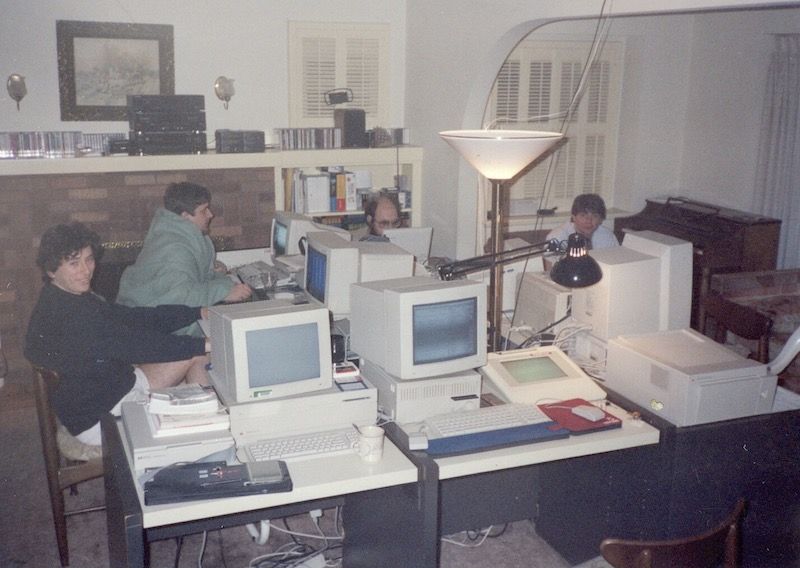
Honestly, it seems to me personally that it was an extremely strange idea: to create a software development cooperative in the USSR.
')
There were few personal computers in the country. Nobody bought the programs - they were simply copied. Therefore, all sensible cooperatives - including the first Soviet millionaire Artem Tarasov - earned on importing computer equipment.
If they were engaged in some kind of software, then only in the load.
But these comrades to trade computers was not interesting. And they created a company that specialized only in software . In fact, it was a startup accelerator that brought together virtually all the talented developers of its time. At first - the Mikrokontur cooperative. Then - Para-Soviet joint venture.
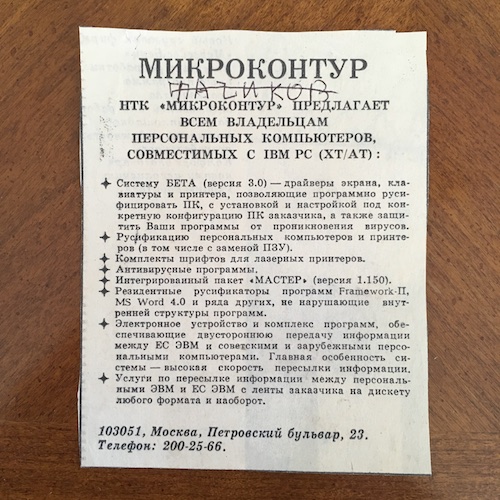
Anton Chizhov , the creator of the famous crack. Evgeny Veselov , the author of the office package "Master". Andrey Skaldin with a set of Russian fonts ... Many people important for the history of the Russian IT-market began their journey there - in the Paragraph.
And this would already be a considerable achievement. But that was only the beginning. They took up the challenge of machine intelligence — handwriting recognition — and solved it better than any team in the world. Despite the iron curtain and the antediluvian technique.
Already in 1991 - a few weeks before the August coup - the Paragraph signed a major contract with the well-known company Apple just for this technology. Soon, a significant part of the Soviet programmers and scientists of the Paragraph moved to Silicon Valley, hitting from a country of shortage in the country of commodity abundance.
Not knowing plainly English, having little idea what the IT market is and how the business works, they nevertheless managed to achieve something. Their recognizer became the key technology for Apple's Newton handheld, a revolutionary device for its time.
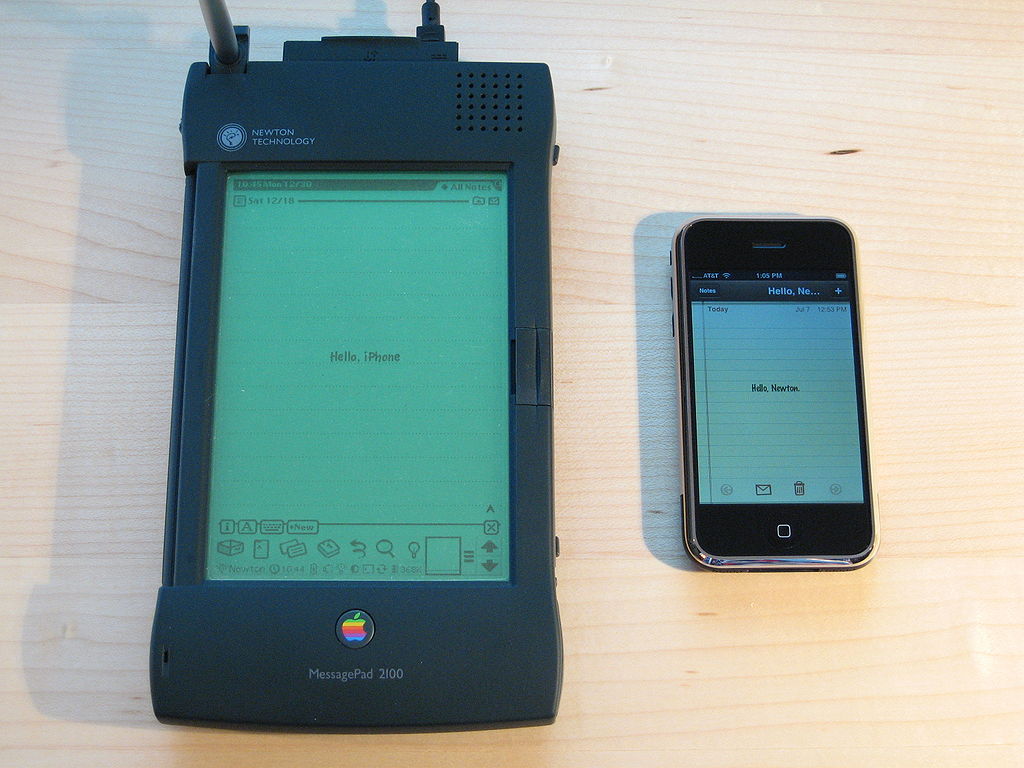
Then there were all sorts of adventures and exploits, deals with Disney, and with Microsoft, the development of an advanced 3d engine, and in the final - a profitable sale to Silicon Graphics .
Another such fact: until now, Paragraph’s handwriting recognition technology is used to sort all American mail. That is, the daily life of America depends on the Russian development. And the founder of the Paragraph, Stepan Pachikov, will later create Evernote - a company, to put it mildly, is also not the last on the market (albeit with a complicated fate).

I met Stepan in 2009, when I worked in Snob magazine, which ordered me to write an essay about him (he ended up in a compilation book of the 30 best articles in the magazine ). Having spent two weeks with Pachikov and typing a mountain of material, I already realized that the story of the Paragraph deserves a book - and for several reasons at once.
1. This is still the story of one of the most famous and successful Russian IT-companies , which "stood at the roots." The history of the “Paragraph” is essentially the story of the origin of the Russian IT-market.
2. Perestroika, cooperatives, the collapse of the USSR, America, Apple, etc. - through the history of one company can show the time . Here that not the actor, the page in the "Wikipedia" - in the range from Garry Kasparov to Larry Tesler .
3. Oddly enough, years have passed, and the history of the Paragraph has only become more relevant. Today, many in Russia are trying to enter the international market, to achieve recognition around the world . Team Pachikov succeeded - despite the fact that the seemingly odds were negligible. How?
4. Well, let's not be boring, this is just an adventure to everything else - to create a private business, first in the USSR and then in America. And they are quite surprising in their own right, without any ideological burden.
For several years I persuaded Pachikov to agree to a book. A year and a half ago, I finally succeeded, and I began to work.
For me, this is not the first experience with books. Ten years ago I wrote the first entrepreneurial history in Russia - the book “ Chichvarkin E ... genius ” (I dare to hope that this book is not as terrible as its cover).
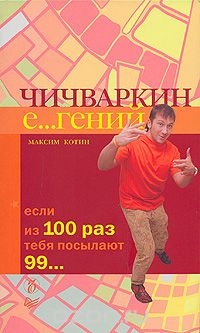
Then - “ And the botanists do business, ” the story of Fyodor Ovchinnikov, the creator of Dodo Pizza , half of the pizza chains, half of the IT companies.
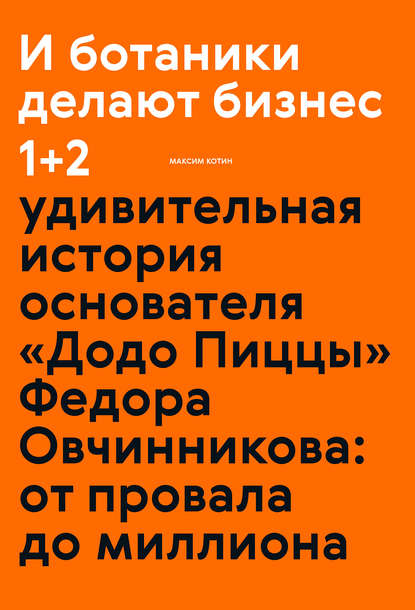
About the "nerds" even once wrote on the "Habre" . In addition, I participated as a producer and editor in other book projects ( 1 , 2 ).
But this time I decided to approach the matter in a completely new way and do it as I have never done before - to lay out the manuscript as I write it .
The book has many characters and characters. I made a newsletter for a small circle of those who participated in the events, which means I could point out some inaccuracies. Over time, the circle of subscribers has grown, and I realized that such a format greatly benefits the cause.
1. Time. I was born in the 1980th year. Many things about this time can simply not understand. But this is not just a startup story - it is also a story of that time. Thanks to the “open format,” knowledgeable people correct me, suggest, complement.
2. Technology. My knowledge of programming is limited to experiments in school with the "Basic" on the computer ZX Spectrum. And although I understand in general how all these things work, my personal competence may still not be enough to describe some details correctly. Well, when I look at the experts.
3. Feedback. The history of the “Paragraph” is a chance to tell the history of the country and the IT industry in a fascinating way, and also to share all the useful experience that people gained while building a large international company. But this is a difficult task that I have not had to solve yet, and I need help here. I believe in the power of crowdsourcing - a lot of smart people can improve the manuscript in a way that no editor can do.
In general, if all this is interesting to you, join - and help make the book, as they say at Apple, "even better." Just read, comment, criticize, and sometimes you can cheer.
Subscribe to the newsletter . You will immediately receive a letter with already written chapters in the form of an epub or pdf. After that, when the new chapter is ready, I will send it immediately in the body of the letter along with the updated files. Between times, I sometimes talk about how the work is going, and share some thoughts about the craft. Mailing out no more than once a week.
Yes, the book will be released on paper early next year - a contract has already been signed with the publishing house Mann, Ivanov and Ferber . I think for subscribers and beta readers we will organize an interesting offer :)
Here are the titles of the finished chapters:
Chapter 1. “Wait a minute,” said Mzhavanadze.
Chapter 2. Watchman
Chapter 3. Computer people
Chapter 4. Beta
Chapter 5. "We can solve any problem"
Chapter 6. The Wild East
Chapter 7. Eight Khrenyatin
Chapter 8. I am a walrus
Beta readers reviews - positive and negative - can be read on my blog . As teasers - here is one review “for”:
And "against."
And I also read fragments of a book in a podcast . Until seven episodes.
I always welcome reviews, criticism, suggestions. You can write directly to author@maxkotin.com
I'm new here. So sorry if something is wrong.

Honestly, it seems to me personally that it was an extremely strange idea: to create a software development cooperative in the USSR.
')
There were few personal computers in the country. Nobody bought the programs - they were simply copied. Therefore, all sensible cooperatives - including the first Soviet millionaire Artem Tarasov - earned on importing computer equipment.
If they were engaged in some kind of software, then only in the load.
But these comrades to trade computers was not interesting. And they created a company that specialized only in software . In fact, it was a startup accelerator that brought together virtually all the talented developers of its time. At first - the Mikrokontur cooperative. Then - Para-Soviet joint venture.

Anton Chizhov , the creator of the famous crack. Evgeny Veselov , the author of the office package "Master". Andrey Skaldin with a set of Russian fonts ... Many people important for the history of the Russian IT-market began their journey there - in the Paragraph.
And this would already be a considerable achievement. But that was only the beginning. They took up the challenge of machine intelligence — handwriting recognition — and solved it better than any team in the world. Despite the iron curtain and the antediluvian technique.
Already in 1991 - a few weeks before the August coup - the Paragraph signed a major contract with the well-known company Apple just for this technology. Soon, a significant part of the Soviet programmers and scientists of the Paragraph moved to Silicon Valley, hitting from a country of shortage in the country of commodity abundance.
Not knowing plainly English, having little idea what the IT market is and how the business works, they nevertheless managed to achieve something. Their recognizer became the key technology for Apple's Newton handheld, a revolutionary device for its time.

Then there were all sorts of adventures and exploits, deals with Disney, and with Microsoft, the development of an advanced 3d engine, and in the final - a profitable sale to Silicon Graphics .
Another such fact: until now, Paragraph’s handwriting recognition technology is used to sort all American mail. That is, the daily life of America depends on the Russian development. And the founder of the Paragraph, Stepan Pachikov, will later create Evernote - a company, to put it mildly, is also not the last on the market (albeit with a complicated fate).

I met Stepan in 2009, when I worked in Snob magazine, which ordered me to write an essay about him (he ended up in a compilation book of the 30 best articles in the magazine ). Having spent two weeks with Pachikov and typing a mountain of material, I already realized that the story of the Paragraph deserves a book - and for several reasons at once.
1. This is still the story of one of the most famous and successful Russian IT-companies , which "stood at the roots." The history of the “Paragraph” is essentially the story of the origin of the Russian IT-market.
2. Perestroika, cooperatives, the collapse of the USSR, America, Apple, etc. - through the history of one company can show the time . Here that not the actor, the page in the "Wikipedia" - in the range from Garry Kasparov to Larry Tesler .
3. Oddly enough, years have passed, and the history of the Paragraph has only become more relevant. Today, many in Russia are trying to enter the international market, to achieve recognition around the world . Team Pachikov succeeded - despite the fact that the seemingly odds were negligible. How?
4. Well, let's not be boring, this is just an adventure to everything else - to create a private business, first in the USSR and then in America. And they are quite surprising in their own right, without any ideological burden.
For several years I persuaded Pachikov to agree to a book. A year and a half ago, I finally succeeded, and I began to work.
For me, this is not the first experience with books. Ten years ago I wrote the first entrepreneurial history in Russia - the book “ Chichvarkin E ... genius ” (I dare to hope that this book is not as terrible as its cover).

Then - “ And the botanists do business, ” the story of Fyodor Ovchinnikov, the creator of Dodo Pizza , half of the pizza chains, half of the IT companies.

About the "nerds" even once wrote on the "Habre" . In addition, I participated as a producer and editor in other book projects ( 1 , 2 ).
But this time I decided to approach the matter in a completely new way and do it as I have never done before - to lay out the manuscript as I write it .
The book has many characters and characters. I made a newsletter for a small circle of those who participated in the events, which means I could point out some inaccuracies. Over time, the circle of subscribers has grown, and I realized that such a format greatly benefits the cause.
1. Time. I was born in the 1980th year. Many things about this time can simply not understand. But this is not just a startup story - it is also a story of that time. Thanks to the “open format,” knowledgeable people correct me, suggest, complement.
2. Technology. My knowledge of programming is limited to experiments in school with the "Basic" on the computer ZX Spectrum. And although I understand in general how all these things work, my personal competence may still not be enough to describe some details correctly. Well, when I look at the experts.
3. Feedback. The history of the “Paragraph” is a chance to tell the history of the country and the IT industry in a fascinating way, and also to share all the useful experience that people gained while building a large international company. But this is a difficult task that I have not had to solve yet, and I need help here. I believe in the power of crowdsourcing - a lot of smart people can improve the manuscript in a way that no editor can do.
In general, if all this is interesting to you, join - and help make the book, as they say at Apple, "even better." Just read, comment, criticize, and sometimes you can cheer.
Subscribe to the newsletter . You will immediately receive a letter with already written chapters in the form of an epub or pdf. After that, when the new chapter is ready, I will send it immediately in the body of the letter along with the updated files. Between times, I sometimes talk about how the work is going, and share some thoughts about the craft. Mailing out no more than once a week.
Yes, the book will be released on paper early next year - a contract has already been signed with the publishing house Mann, Ivanov and Ferber . I think for subscribers and beta readers we will organize an interesting offer :)
Here are the titles of the finished chapters:
Chapter 1. “Wait a minute,” said Mzhavanadze.
Chapter 2. Watchman
Chapter 3. Computer people
Chapter 4. Beta
Chapter 5. "We can solve any problem"
Chapter 6. The Wild East
Chapter 7. Eight Khrenyatin
Chapter 8. I am a walrus
Beta readers reviews - positive and negative - can be read on my blog . As teasers - here is one review “for”:
The book is like a drug. Reading the chapter that came in the mail, you are already waiting for the next one. Honestly, when I saw the description of the future book in the channel of Sergei Kaplichny, I thought: “Some kind of Baida” ... As they say the same story, 2 different people will be served completely differently. A PARAGRAPH is the case when you read and understand that you will return to the book more than once.
And "against."
Sadly painful protruding political position, it provides fertile ground for reflection on the personal injuries of the author and who is ordering this work and for what.
And I also read fragments of a book in a podcast . Until seven episodes.
I always welcome reviews, criticism, suggestions. You can write directly to author@maxkotin.com
I'm new here. So sorry if something is wrong.
Source: https://habr.com/ru/post/419953/
All Articles